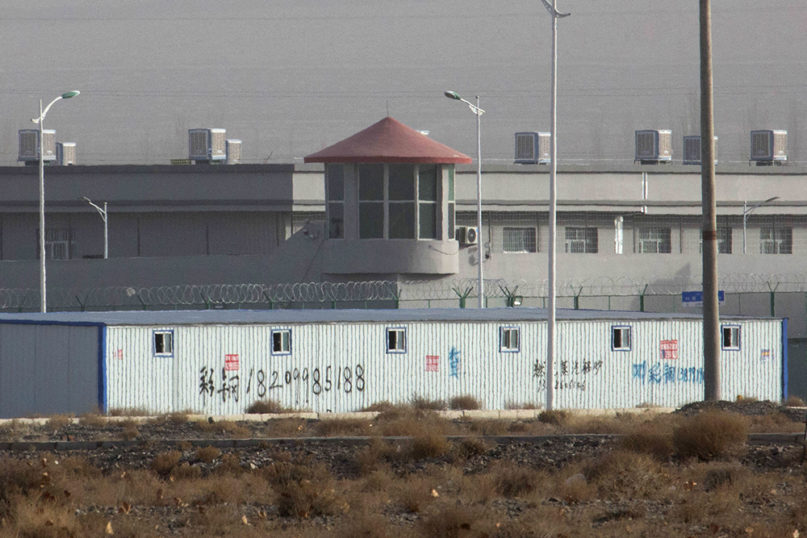
(RNS) — What is the most serious violation of religious liberty in the world today? If you answered “China’s persecution of Uighur and other minority Muslim communities in the province of Xinjiang,” you’d be right.
Over the past four years, the Chinese government has made a concerted effort to destroy these communities, sending more than a million Xinjiang Muslims to internment camps and subjecting them to torture and sexual abuse as part of their “reeducation.” Outside the camps, security forces oppress the rest of the population, including by forced sterilization and separation of children from parents.
From the internal Chinese government documents published last November by The New York Times, we know that all this has taken place under the direct orders of President Xi Jinping.
On May 27, a virtually unanimous Congress completed action on the Uyghur Human Rights Policy Act, which requires U.S. intelligence agencies to report on Chinese abuses and gives the president 180 days to identify Chinese officials responsible for the oppression and sanction them with asset blocking, visa revocation and ineligibility for entry into the United States.
Did President Donald Trump immediately conduct a signing ceremony applauding the bill’s sponsors and making a statement denouncing China’s appalling human rights abuses? By no means.
Ten days transpired with no presidential action, automatically making the bill law. Then, on June 17, the White House announced that the president had affixed his signature. That happened to be the day John Bolton’s memoir hit the media.
The big news was the former national security adviser’s account of a meeting between Trump and Xi at the June 2019 G-20 economic summit in Osaka, Japan; to wit:
With only interpreters present, Xi had explained to Trump why he was basically building concentration camps in Xinjiang. According to our interpreter, Trump said that Xi should go ahead with building the camps, which Trump thought was exactly the right thing to do. The National Security Council’s top Asia staffer, Matthew Pottinger, told me that Trump said something very similar during his November 2017 trip to China.
In an interview with The Wall Street Journal on the evening of the 17th, Trump called Bolton a liar and denied giving Xi the green light to build the camps. Four days later, he told Axios’ Jonathan Swan that he’d declined to impose sanctions against Chinese officials proposed by the Treasury Department in September of 2018 because “we were in the middle of a major trade deal.”

In this Dec. 3, 2018, file photo, a guard tower and barbed wire fences are seen around a facility in the Kunshan Industrial Park in Artux in western China’s Xinjiang region. The U.S. considers facilities like this to be detention camps for Uighur Muslims. (AP Photo/Ng Han Guan, File)
Fast-forward to last week, when the State and Treasury departments announced that they were imposing sanctions on Chinese officials involved in the Xinjiang persecution and the Xinjiang security agency. These invoke the Global Magnitsky Act, under which the U.S. blocks financial transactions involving property owned by the sanctioned individuals.
On Monday, the Chinese government responded by announcing its own sanctions on Sen. Ted Cruz, Sen. Marco Rubio and Rep. Chris Smith, the Republicans who pushed hardest for the Uighur bill in Congress, and on Sam Brownback, the U.S. ambassador for international religious freedom.
Thus far, not a word from Trump himself on this exchange of sanctions. The president, who is not shy about expressing outrage, has thus far emitted nary a tweet on behalf of the Uighurs. Xi will understand that the leader of the free world couldn’t care less about China’s human rights abuses — as if Xi had any doubt about that.
To its credit, the United States Commission on International Religious Freedom has for years been a harsh critic of China’s oppression of the Uighurs. Hardly had the president signed the Uyghur Human Rights Policy Act than it issued a statement thanking him.
In its 2020 annual report, issued in April, USCIRF called on the U.S. government to “(p)ublicly express concerns about Beijing hosting the 2022 Winter Olympic Games and state that U.S. government officials will not attend the games if the Chinese government’s crackdown on religious freedom continues.” In an op-ed a few days later, Commissioners Gary Bauer and Tenzin Dorjee wrote, “While we cannot and should not deny our athletes a chance to compete, the U.S. government must also stand up for America’s values.”
Let’s be serious. Balancing the chance of a few dozen elite athletes to compete in the Olympics against the incarceration of a million people in concentration camps is not a close call. If Congress cares enough about religious oppression in China to make an actual impression on its government, it needs to enact a boycott of the games.
